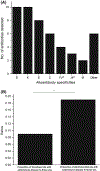Chronic inflammatory autoimmune disorders are a risk factor for red blood cell alloimmunization
- PMID: 26456151
- PMCID: PMC7025713
- DOI: 10.1111/bjh.13781
Chronic inflammatory autoimmune disorders are a risk factor for red blood cell alloimmunization
Keywords: RBC alloantibodies; RBC alloimmunization; blood group antigens; chronic inflammatory disorders; inflammation.
Conflict of interest statement
Conflicts of interest
The authors (ABR, JEH, CAT) report no relevant financial conflicts of interest.
Figures

Comment on
-
Red blood cell alloimmunization is influenced by recipient inflammatory state at time of transfusion in patients with sickle cell disease.Br J Haematol. 2015 Jan;168(2):291-300. doi: 10.1111/bjh.13123. Epub 2014 Sep 26. Br J Haematol. 2015. PMID: 25256676
References
-
- Fasano RM, Booth GS, Miles M, Du L, Koyama T, Meier ER & Luban NL (2015) Red blood cell alloimmunization is influenced by recipient inflammatory state at time of transfusion in patients with sickle cell disease. British Journal of Haematology, 168, 291–300. - PubMed
-
- Hendrickson JE, Desmarets M, Deshpande SS, Chadwick TE, Hillyer CD, Roback JD & Zimring JC (2006) Recipient inflammation affects the frequency and magnitude of immunization to transfused red blood cells. Transfusion, 46, 1526–1536. - PubMed
-
- Papay P, Hackner K, Vogelsang H, Novacek G, Primas C, Reinisch W, Eser A, Mikulits A, Mayr WR & Körmöczi GF (2012) High risk of transfusion-induced alloimmunization of patients with inflammatory bowel disease. American Journal of Medicine, 125, 717.e1–717.e8. - PubMed
-
- Ramsey G & Smietana SJ (1995) Multiple or uncommon red blood cell alloantibodies in women: association with autoimmune disease. Transfusion, 35, 582–586. - PubMed
Publication types
MeSH terms
Substances
Grants and funding
LinkOut - more resources
Full Text Sources
Other Literature Sources

